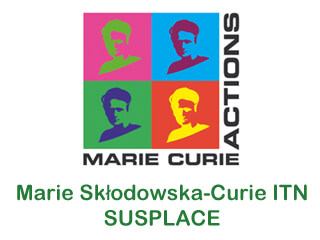Marie Skłodowska-Curie ITN- SUSPLACE

SUSPLACE is a Marie Curie Actions Initial Training Network funded by the European Commission that will kick-off October 1, 2015. SUSPLACE aims to train 15 Early Stage Researchers (ESR) in innovative, interdisciplinary approaches to study sustainable place-shaping practices. These 15 ESR positions at six universities are now open for application till October 7, 2015. See the list of the 15 individual research projects and host universities below.
The SUSPLACE approach will provide insight into how to utilize the full potential of places and communities for development and help to build capacities of people to engage in place-shaping processes and thus strengthen connectivity between policy-makers, academics, businesses and civil society.
Sustainable place-shaping is theoretically framed within a relational approach to place. Place is seen as an assemblage of social relations continuously reconfigured as a result of unbound economic, institutional and cultural transformation processes. The nature of a place is not just a matter of its internal, essential features, but a product of its connectivity with other places. Processes of globalisation have provoked un-sustainabilities reflected in inequalities, exclusion, poverty, economic shrinkage, resource depletion, ecological hazards and food insecurity in various places. Via adopting a place-based, relational approach, SUSPLACE will address the in time and space differentiated outcomes of these unbound transformation processes. Sustainable place-shaping entails a well-balanced:
- socio-cultural re-appreciation of respective places;
- ecological re-grounding of practices in place-specific assets and resources;
- political-economic re-positioning towards markets, technology and policies.
SUSPLACE provides a unique opportunity for 15 ESRs to potentially acquire a PhD degree in an exciting and emerging field of research. SUSPLACE brings together six academic and seven nonacademic partners in six European countries.
Academic partners (host universities):
- Rural Sociology Group, Wageningen University (WU), Netherlands;
- Sustainable Places Research Institute, Cardiff University (CU), United Kingdom;
- Faculty of Social Sciences, Latvia University (LU), Lativa;
- Department of Social, Political and Territorial Sciences, University of Aveiro (UAVR), Portugal;
- Luke Economics and Society Research Unit, Luke Natural Resources Institute (LUKE), Finland;
- Department of Earth and Environmental Sciences, Katholieke Universiteit Leuven (KU Leuven), Belgium.
Non-academic partners:
- Royal HaskoningDHV BV (RHDHV), The Netherlands;
- Foundation Except Integrated Sustainability (EXCEPT), The Netherlands; 3. Visionary Analytics (VA), Lithuania;
- Welsh Government (WG); Wales, United Kingdom;
- Binaural – Associação Cultural de Nodar (BN), Portugal;
- SKEY (Suomen Kestävän Elämäntavan Yhteisöt ry) Global Eco village Network Finland (GEN-Finland), Finland;
- Kalnciema Quarter (KQ), Latvia.
The seven non-academic partners will offer professional courses, secondments, exchange opportunities and training ‘on the job’.
Together the SUSPLACE consortium offer an interdisciplinary training programme consisting of compulsory training in basic and advanced skills in social science disciplines and interdisciplinary courses, professional skills training and training-through-research, optional courses, a Summer School and participation in communication & dissemination activities. The SUSPLACE programme offers a cutting edge research and training program based on an innovative methodology, an interdisciplinary network, a significant and diversified involvement of the public and private sector as well as NGOs. The SUSPLACE methodology includes multi-methods, inter-disciplinarity, a relational notion to place, development of place-based comparative studies, a participative approach engaging citizens and stakeholders, and cooperation between the academic and non-academic partners. The sound interdisciplinary training base and the level of professional skills that the project promotes will enhance mobility and promote the development of researchers in the early stages of their career. A unique aspect of the project is the mutual recognition of the training programme, which implies that successfully completed projects will give access to a PhD degree at every partner university.
The SUSPLACE training programme provides the broadest possible education necessary for a future academic or non-academic career. It will provide them with career opportunities as researchers, change agents, connectors and intermediates in collective forms of sustainable place-shaping and a future position at e.g. at local and regional governmental bodies, NGOs, consultancies or business companies.
Eligibility and mobility
SUSPLACE offers 15 individual research projects across six countries organised around five thematically organised Work Packages with each three ERS research projects. The contract duration is three years, starting April 1, 2016.
For further information regarding each project please consult the website of the host university. Applications have to be submitted to the host university. For more general questions about the SUSPLACE Programme you can contact the SUSPLACE coordinators: lummina.horlings@wur.nl or dirk.roep@wur.nl.
You are eligible as an Early Stage Researcher (ESR) if at the time of recruitment by the host university you are (i) in possession of a university master degree and (ii) have a maximum of four years of full-time research experience, including any period of research training. The last is measured from the date when you obtained the degree which formally entitles you to embark on a doctorate. Selection is, thus, based on professional experience in research, not on age. Please note that ESR should not be PhD holders. In addition you are only eligible to the position at a host university if at the time of the recruitment you did not reside or carry out your main activity (work, studies, etc.) in the country of the host university for more than 12 months in the three years immediately prior to your recruitment.
The enhancement of transnational mobility to improve career perspectives is the main goal of the Marie Curie Initial Training Network funding. Therefore, you are required to undertake transnational mobility when taking up a position in the SUSPLACE project. ESRs will follow training in different countries and spend two secondments for three months at an academic or non-academic partner. See the overview below.